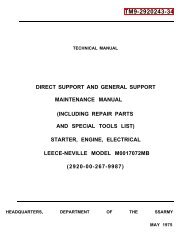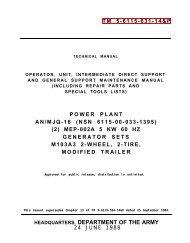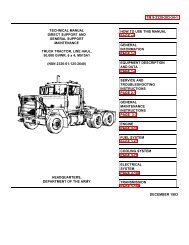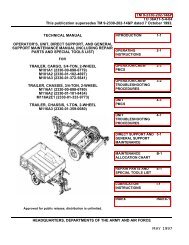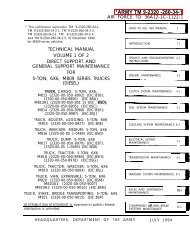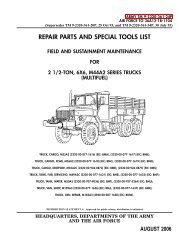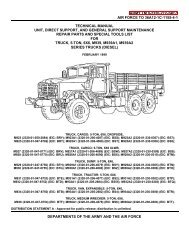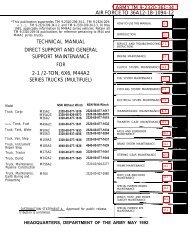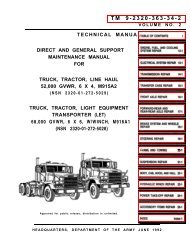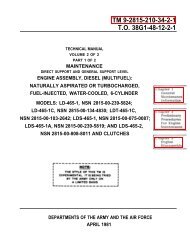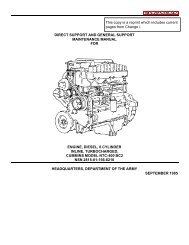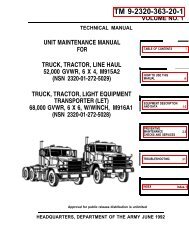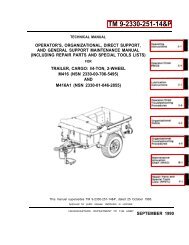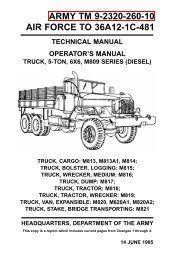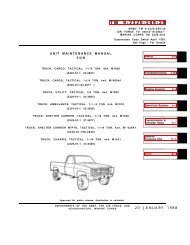DIESEL FUEL LUBRICITY ADDITIVES STUDY RESULTS
DIESEL FUEL LUBRICITY ADDITIVES STUDY RESULTS
DIESEL FUEL LUBRICITY ADDITIVES STUDY RESULTS
Create successful ePaper yourself
Turn your PDF publications into a flip-book with our unique Google optimized e-Paper software.
<strong>DIESEL</strong> <strong>FUEL</strong> <strong>LUBRICITY</strong> <strong>ADDITIVES</strong> <strong>STUDY</strong> <strong>RESULTS</strong><br />
The following are the preliminary results of a research study on diesel fuel<br />
Lubricity Additives. There is likely to be further commentary and explanation<br />
added at a future time.<br />
PURPOSE:<br />
The purpose of this research was to determine the ability of multiple diesel<br />
fuel additives to replace the vital lubricity component in ULSD (Ultra Low<br />
Sulfur Diesel) fuel.<br />
HISTORY:<br />
ULSD fuel is the fuel currently mandated for use in all on road diesel<br />
engines. This fuel burns cleaner and is less polluting than its predecessor,<br />
called Low Sulfur Diesel Fuel. Low sulfur fuel contained less than 500 ppm of<br />
sulfur. ULSD contains 15 ppm or less.<br />
As diesel fuel is further refined to remove the polluting sulfur, it is<br />
inadvertently stripped of its lubricating properties. This vital lubrication is a<br />
necessary component of the diesel fuel as it prevents wear in the fuel<br />
delivery system. Specifically, it lubricates pumps, high pressure pumps and<br />
injectors. Traditional Low sulfur diesel fuel typically contained enough<br />
lubricating ability to suffice the needs of these vital components. ULSD fuel,<br />
on the other hand, is considered to be very “dry” and incapable of lubricating<br />
vital fuel delivery components. As a result, these components are at risk of<br />
premature and even catastrophic failure when ULSD fuel is introduced to the<br />
system. As a result, all oil companies producing ULSD fuel must replace the<br />
lost lubricity with additives. All ULSD fuel purchased at retail fuel stations<br />
SHOULD be adequately treated with additives to replace this lost lubricity.<br />
The potential result of using inadequately treated fuel, as indicated above,<br />
can be catastrophic. There have been many documented cases of randomly<br />
tested samples of diesel fuel. These tests prove that often times the fuel we<br />
purchase is not adequately treated and may therefore contribute to<br />
accelerated wear of our fuel delivery systems. For this reason it may be<br />
prudent to use an after market diesel fuel additive to ENSURE adequate<br />
lubrication of the fuel delivery system. Additionally, many additives can offer<br />
added benefits such as Cetane improver, anti-gel agents and water<br />
separators (demulsifiers). Some fuel additives include water emulsifiers that<br />
cause the water to remain in suspension with the fuel.<br />
Copyright © The Diesel Place & A. D. Spicer - 1 -<br />
August, 2007



